Constitutional Tribunal (Poland)
The Constitutional Tribunal (Polish: Trybunał Konstytucyjny) is the constitutional court of the Republic of Poland, a judicial body established to resolve disputes on the constitutionality of the activities of state institutions; its main task is to supervise the compliance of statutory law with the Constitution of the Republic of Poland.
| Constitutional Tribunal | |
|---|---|
| Trybunał Konstytucyjny | |
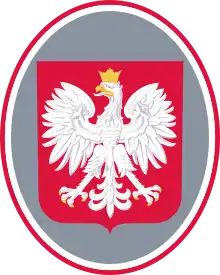 | |
| Established | March 26, 1982 (constitutional amendment establishing the Constitutional Tribunal) 1986, beginning of the activity |
| Location | Warsaw |
| Composition method | Prime ministerial nomination with Sejm RP confirmation President and Vice President appointed by President of the Republic |
| Authorized by | Constitution of the Republic of Poland |
| Judge term length | 9 years, only one term |
| Number of positions | 15 |
| Website | www |
| President | |
| Currently | Julia Przyłębska (disputed) |
| Since | 21 December 2016 |
| Vice President | |
| Currently | dr hab. Mariusz Muszyński (disputed) |
| Since | 5 July 2017 |
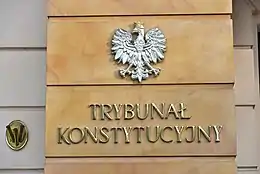
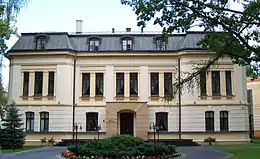
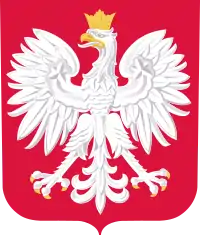 |
|---|
| This article is part of a series on the politics and government of Poland |
|
|
Its creation was a request of the Solidarity movement following its 1981 National Congress that took place a few weeks before the introduction of martial law.[1] The Tribunal was established on 26 March 1982 and judges took office on 1 January 1986.
The tribunal's powers increased in 1989 with the transition to the capitalist Third Polish Republic and in 1997 with establishment of a new Constitution.[2] The Constitution mandates that its 15 members are elected by the Sejm, the lower house, for 9 years. It was the subject of an appointment crisis in 2015.
It should not be confused with the Supreme Court of Poland.
Powers
The Constitutional Tribunal adjudicates on the compliance with the Constitution of legislation and international agreements (also their ratification), on disputes over the powers of central constitutional bodies, and on compliance with the Constitution of the aims and activities of political parties. It also rules on constitutional complaints.
Composition
The Constitutional Tribunal is made up of 15 judges chosen by the Sejm RP (the lower house of parliament) for single nine-year terms. The Constitutional Tribunal constitutes one of the formal guarantees of a state grounded on the rule of law.
Three judges, appointed by the President of the Tribunal, serve as members of the National Electoral Commission (Act of 5 January 2011 Electoral Code).
History
1982–1989: People's Republic of Poland
The Constitutional Tribunal was established by the amendment of the Constitution of the People's Republic of Poland on 26 March 1982.[1] Due to the brevity of the introduced article 33a, it was decided that a law must be brought forth that would outline the proceedings of the Constitutional Tribunal.[3] This became an intricate process with 15 drafts developed, and the final act was ratified by the Sejm on 29 April 1985 which allowed for the formal commencement of the Tribunal's judicial proceedings on 1 January 1986.[3] But the courts competence and judicial capacity were limited at this time, as all rulings on the constitutionality of bills could be dismissed by a 2/3 majority vote in the Sejm.[2] This in effect would place the rulings in an indefinite moratorium as these votes rarely occurred.[2]
On 24 January 1986 the first motion, reference U 1/86, was brought before the Constitutional Tribunal on behalf of the Presidium of the Provincial National Council in Wrocław.[3] The claimants sought to contend two paragraphs of the Ordinance of the Council of Ministers in regard to the sale of state property and the procedures and costs related to it as unconstitutional.[3] In opposition to the government's stance, the court ruled in a 3-member panel on 28 May 1986 that the introduced paragraphs were unconstitutional.[3] The Council of Ministers called for a reevaluation of the case, but on 5 November 1986 the Constitutional Tribunal upheld its ruling.[3]
1989–2014: Third Polish Republic
In 1989 the Constitutional Tribunal's powers expanded as it secured the right to universally decide on the binding interpretation of laws.[2] Many changes came with the enactment of the 1997 Constitution; the number of judges increased from 12 to 15, terms of office were elongated by 1 year for a total of 9 years, and the Tribunal lost its competence to decide the interpretation of legal statutes (in the form of abstract provisions).[2]
2015–present: Polish Constitutional Court crisis

In June 2015, the Sejm of the VII tenure enacted a new provision on the Constitutional Tribunal in which it sought to transfer the power of election of all Constitutional Tribunal judges whose term ended in 2015 to the Sejm.[4] Subsequently, 5 judges were elected by the Sejm on 8 October 2015 and an additional 5 on 2 December 2015 by the Sejm of the VIII tenure which resulted in what was known as the 2015 Polish Constitutional Court crisis.[4] Between November 2015 and December 2016, 6 so-called remedial bills which were devised by the Law and Justice (PiS) party were enacted and in December 2016 the President of the Constitutional Tribunal replaced 3 judges appointed by the VII tenure with 3 judges from the VIII tenure.[4]
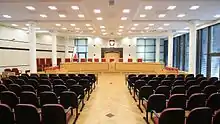
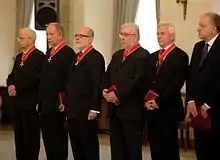
Since the reform and takeover of the Constitutional Tribunal by politicians from the ruling party, the independence and sovereignty of the institution has been criticized and often called a "puppet court" by many Polish judges' associations and foreign judicial organisations and also by their counterparts in the Constitutional Tribunals of other countries.[5][6][7][8] In February 2020, former Constitutional Tribunal judges, including former presidents of the tribunal Andrzej Rzepliński, Marek Safjan, Jerzy Stępień, Bohdan Zdziennicki and Andrzej Zoll, stated,
We, the undersigned retired judges of the Constitutional Tribunal, regret to state that the actions of the legislature and the executive since 2015, and the Constitutional Tribunal leadership since 2017, have led to a dramatic decline in the significance and the prestige of this constitutional body, as well as to the inability to perform its constitutional tasks and duties. Unfortunately, the widespread belief that the Constitutional Tribunal has virtually been abolished is correct.
— former Constitutional Tribunal judges, Ruleoflaw.pl[9]
In 2016 Julia Przyłębska, an ally of Law and Justice was appointed as President of the Constitutional Tribunal. Her appointment is open to the challenge that it is unconstitutional because she was appointed directly by the President of the Republic rather than being elected by judges on the Tribunal, as required by Poland's Constitution. Her controversial appointment brought the total of women on the fifteen person Tribunal to two (together with Krystyna Pawłowicz).
Landmark decisions
On 22 October 2020, in the context of COVID-19 restrictions on rights of assembly, a ruling was handed down by the Tribunal President Julia Przyłębska declaring that abortion in Poland due to foetal abnormality was unconstitutional, effectively making legal abortions on that basis unobtainable for women in Poland. The ruling triggered the October 2020 Polish protests. As of 22 October 2020, the ruling had not yet been published in Dziennik Ustaw.[10]
Presidents and Vice Presidents
| No. | Start and end date | Full name | [lower-alpha 1] | Sejm | Term as a Justice | Term length |
|---|---|---|---|---|---|---|
| Presidents | ||||||
| 1. | 1 December 1985 – 1 December 1989 | prof. Alfons Klafkowski | IX (PRL) | 1 December 1985 – 1 December 1989 | 4 years, 0 days | |
| 2. | 1 December 1989 – 19 November 1993[12] | prof. Mieczysław Tyczka | X (PRL) | 1 December 1989 – 17 June 1994 | 4 years, 198 days (resigned) | |
| 3. | 19 November 1993[13] – 1 December 1997 | prof. Andrzej Zoll | X (PRL) | 1 December 1989 – 1 December 1997 | 8 years, 0 days | |
| – | 1 December 1997 – 6 January 1998 | vacat | ||||
| 4. | 6 January 1998[14] – 5 November 2006 | prof. Marek Safjan | III | 5 November 1997 – 5 November 2006 | 9 years, 0 days | |
| 5. | 6 November 2006[15] – 25 June 2008 | Jerzy Stępień | III | 25 June 1999 – 25 June 2008 | 9 years, 0 days | |
| 6. | 26 June 2008[16] – 2 December 2010 | dr Bohdan Zdziennicki | IV | 2 December 2001 – 2 December 2010 | 9 years, 0 days | |
| 7. | 3 December 2010 – 19 December 2016 | prof. Andrzej Rzepliński | VI | 19 December 2007 – 19 December 2016 | 9 years, 0 days | |
| – | 20 December 2016 | Julia Przyłębska[lower-alpha 2] | VIII | 9 December 2015 | 5 years, 57 days | |
| 8. | 21 December 2016 | |||||
| No. | Start and end date | Full name | [lower-alpha 1] | Sejm | Term as a Justice | Term length |
|---|---|---|---|---|---|---|
| Vice Presidents | ||||||
| 1. | 1 December 1985 – 1 December 1993 | prof. Leonard Łukaszuk | IX (PRL) | 1 December 1985 – 1 December 1993 | 8 years, 0 days | |
| 2. | 1 December 1993 – 1 December 2001 | prof. Janusz Trzciński | II | 1 December 1993 – 1 December 2001 | 8 years, 0 days | |
| 3. | 2 December 2001 – 1 December 2006 | prof. Andrzej Mączyński | III | 1 December 1997 – 1 December 2006 | 9 years, 0 days | |
| 4. | 2 December 2006 – 2 March 2010 | Janusz Niemcewicz[17] | III | 2 March 2001 – 2 March 2010 | 9 years, 0 days | |
| 5. | 3 March 2010 – 2 December 2010 | dr hab. Marek Mazurkiewicz | IV | 2 December 2001 – 2 December 2010 | 9 years, 0 days | |
| 6. | 3 December 2010 – 26 June 2017 | prof. Stanisław Biernat | VI | 26 June 2008 – 26 June 2017 | 9 years, 0 days | |
| – | 27 June – 4 July 2017 | vacated | ||||
| 7. | 5 July 2017 | dr hab. Mariusz Muszyński[lower-alpha 2] | VIII | 2 December 2015 | 5 years, 64 days | |
| No. | Start and end date | Full name | [lower-alpha 1] | Sejm | Term as a Justice | Term length |
Nominated by PiS or its coalition partners | ||||||
Nominated by PO or its coalition partners | ||||||
Nominated by Democratic Left Alliance, Solidarity, or its coalition partners | ||||||
Current Justices
| No. | Full name | [lower-alpha 1] | Sejm | Votes | Start date | Term length | Comment |
|---|---|---|---|---|---|---|---|
| 59. | prof. Leon Kieres | VIII | 340 | 23 July 2012[18] | 8 years, 196 days | ||
| 62. | dr hab. Mariusz Muszyński | 236 | 2 December 2015[19] | 5 years, 64 days | Vice-President of The Tribunal since 5 July 2017 Election disputed[lower-alpha 2] | ||
| 63. | Piotr Pszczółkowski[20] | 233 | 3 December 2015 | 5 years, 63 days | Election disputed[lower-alpha 2] | ||
| 64. | Julia Przyłębska[21] | 234 | 9 December 2015 | 5 years, 57 days | President of the Tribunal since 21 December 2016 Election disputed[lower-alpha 2] | ||
| 65. | dr hab. Zbigniew Jędrzejewski | 227 | 28 April 2016[22] | 4 years, 282 days | |||
| 66. | dr hab. Michał Warciński[23] | 231 | 20 December 2016 | 4 years, 46 days | |||
| 68. | dr Andrzej Zielonacki[24] | 227 | 28 June 2017[25] | 3 years, 221 days | |||
| 69. | dr hab. Justyn Piskorski[26] | 248 | 18 September 2017[27] | 3 years, 139 days | |||
| 70. | dr hab. Jarosław Wyrembak[28] | 228 | 30 January 2018[29] | 3 years, 5 days | |||
| 71. | dr Wojciech Sych[30] | 228 | 8 April 2019[31] | 1 year, 302 days | |||
| 72. | dr hab. Krystyna Pawłowicz[32] | IX | 230 | 5 December 2019[33] | 1 year, 61 days | ||
| 73. | Stanisław Piotrowicz[34] | 230 | 5 December 2019[33] | 1 year, 61 days | |||
| 74. | prof. Jakub Stelina[35] | 233 | 5 December 2019[33] | 1 year, 61 days | |||
| 75. | dr hab. Rafał Wojciechowski[36] | 239 | 7 January 2020[37] | 1 year, 28 days | |||
| 76. | Bartłomiej Sochański[38] | 234 | 9 April 2020[39] | 301 days | |||
Nominated by PiS or its coalition partners | |||||||
Nominated by PO or its coalition partners | |||||||
The three judges appointed on 2 December 2015 (Henryk Cioch, Lech Morawski, Mariusz Muszyński) are disputed. The Sejm appointed them (with two others) before the parliamentary elections of 2015; after these elections, the Sejm invalidated their appointment and elected five new judges in their place. The president denied the serment to the five appointed before the election and swore the five new judges in. Cioch and Morawski died while in office. Two new judges were appointed: Justyn Piskorski and Jarosław Wyrembak.
Of the appointments made before the election, the Constitutional Tribunal itself invalidated two (Bronisław Sitek and Andrzej Sokala) and accepted three (Roman Hauser, Krzysztof Ślebzak and Andrzej Jakubecki). As a consequence, of the appointments made after the election, the Tribunal accepted two (Piotr Pszczółkowski and Julia Przyłębska) and invalidated three (Henryk Cioch, Lech Morawski and Mariusz Muszyński). See Polish Constitutional Court crisis, 2015.
Length of tenure
This graphical timeline depicts the length of each current justice's tenure on the Court:
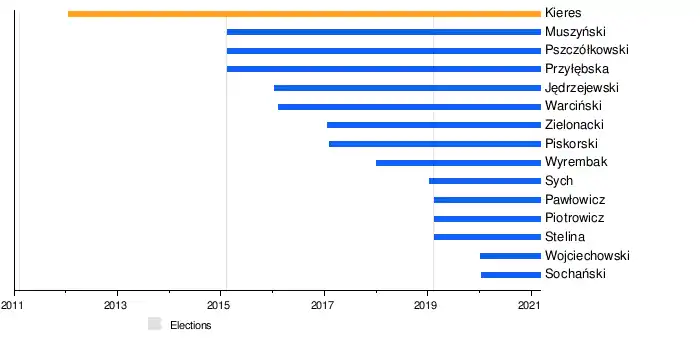
Former
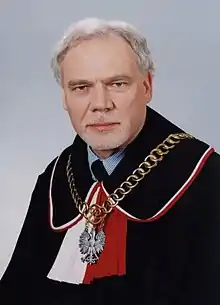
| No. | Full name | [lower-alpha 1] | Sejm | Term as a Justice | Term length |
|---|---|---|---|---|---|
| 1. | prof. Henryk de Fiumel | IX (PRL) | 1 December 1985 – 17 June 1986 | 198 days (died in office) | |
| 2. | prof. Kazimierz Buchała | 1 December 1985 – 1 December 1989 | 4 years, 0 days | ||
| 3. | prof. Natalia Gajl | 1 December 1985 – 1 December 1989 | 4 years, 0 days | ||
| 4. | dr Adam Józefowicz | 1 December 1985 – 1 December 1989 | 4 years, 0 days | ||
| 5. | dr Andrzej Kabat | 1 December 1985 – 1 December 1989 | 4 years, 0 days | ||
| 6. | prof. Alfons Klafkowski | 1 December 1985 – 1 December 1989 | 4 years, 0 days | ||
| 7. | prof. Stanisław Pawela | 1 December 1985 – 1 December 1989 | 4 years, 0 days | ||
| 8. | dr Czesław Bakalarski | 1 December 1985 – 1 December 1993 | 8 years, 0 days | ||
| 9. | prof. Kazimierz Działocha | 1 December 1985 – 1 December 1993 | 8 years, 0 days | ||
| 10. | prof. Henryk Groszyk | 1 December 1985 – 1 December 1993 | 8 years, 0 days | ||
| 11. | prof. Leonard Łukaszuk | 1 December 1985 – 1 December 1993 | 8 years, 0 days | ||
| 12. | Remigiusz Orzechowski | 1 December 1985 – 13 August 1993 | 7 years, 255 days (died in office) | ||
| 13. | Maria Łabor-Soroka[40] | - | 25 November 1986 – 30 November 1993 | 7 years, 5 days | |
| 14. | Antoni Filcek | X (PRL) | 1 December 1989 – 31 October 1992 | 2 years, 335 days (resigned) | |
| 15. | prof. Mieczysław Tyczka | 1 December 1989 – 17 June 1994 | 4 years, 198 days (resigned) | ||
| 16. | prof. Janina Zakrzewska | 1 December 1989 – 27 May 1995 | 5 years, 177 days (died in office) | ||
| 17. | prof. Tomasz Dybowski | 1 December 1989 – 1 December 1997 | 8 years, 0 days | ||
| 18. | prof. Wojciech Łączkowski | 1 December 1989 – 1 December 1997 | 8 years, 0 days | ||
| 19. | prof. Andrzej Zoll | 1 December 1989 – 1 December 1997 | 8 years, 0 days | ||
| 20. | Ferdynand Rymarz | - | I | 19 February 1993 – 19 February 2001[41] | 8 years, 0 days |
| 21. | dr hab. Błażej Wierzbowski | II | 1 December 1993 – 30 November 1998[42] | 4 years, 364 days (resigned) | |
| 22. | prof. Wojciech Sokolewicz | 1 December 1993 – 31 May 1999[42] | 5 years, 181 days (resigned) | ||
| 23. | prof. Zdzisław Czeszejko-Sochacki | 1 December 1993 – 1 December 2001[42] | 8 years, 0 days | ||
| 24. | prof. Lech Garlicki | 1 December 1993 – 1 December 2001[42] | 8 years, 0 days | ||
| 25. | Stefan Jan Jaworski | 1 December 1993 – 1 December 2001[42] | 8 years, 0 days | ||
| 26. | prof. Janusz Trzciński | 1 December 1993 – 1 December 2001[42] | 8 years, 0 days | ||
| 27. | prof. Krzysztof Kolasiński | - | 27 May 1994 – 27 May 2002[43] | 8 years, 0 days | |
| 28. | Jadwiga Skórzewska-Łosiak | 21 July 1995 – 21 July 2003[44] | 8 years, 0 days | ||
| 29. | prof. Teresa Dębowska-Romanowska | III | 5 November 1997 – 5 November 2006[45] | 9 years, 0 days | |
| 30. | prof. Marek Safjan | 5 November 1997 – 5 November 2006[45] | 9 years, 0 days | ||
| 31. | prof. Marian Zdyb | 5 November 1997 – 5 November 2006[45] | 9 years, 0 days | ||
| 32. | Wiesław Johann | 1 December 1997 – 1 December 2006[46] | 9 years, 0 days | ||
| 33. | prof. Biruta Lewaszkiewicz-Petrykowska | 1 December 1997 – 1 December 2006[46] | 9 years, 0 days | ||
| 34. | prof. Andrzej Mączyński | 1 December 1997 – 1 December 2006[46] | 9 years, 0 days | ||
| 35. | dr hab. Jerzy Ciemniewski | 18 December 1998 – 18 December 2007[47] | 9 years, 0 days | ||
| 36. | Jerzy Stępień | 25 June 1999 – 25 June 2008[48] | 9 years, 0 days | ||
| 37. | Janusz Niemcewicz | 2 March 2001 – 2 March 2010[49] | 9 years, 0 days | ||
| 38. | prof. Marian Grzybowski | IV | 2 December 2001 – 2 December 2010[50] | 9 years, 0 days | |
| 39. | dr hab. Marek Mazurkiewicz | 2 December 2001 – 2 December 2010[50] | 9 years, 0 days | ||
| 40. | dr hab. Mirosław Wyrzykowski | 2 December 2001 – 2 December 2010[50] | 9 years, 0 days | ||
| 41. | dr Bohdan Zdziennicki | 2 December 2001 – 2 December 2010[50] | 9 years, 0 days | ||
| 42. | prof. Ewa Łętowska | 28 May 2002 – 28 May 2011[51] | 9 years, 0 days | ||
| 43. | prof. Adam Jamróz | 22 July 2003 – 22 July 2012[52] | 9 years, 0 days | ||
| 44. | dr hab. Maria Gintowt-Jankowicz | V | 6 November 2006 – 6 November 2015[53] | 9 years, 0 days | |
| 45. | Wojciech Hermeliński | 6 November 2006 – 6 November 2015[53] | 9 years, 0 days | ||
| 46. | Marek Kotlinowski | 6 November 2006 – 6 November 2015[53] | 9 years, 0 days | ||
| 47. | dr hab. Zbigniew Cieślak | 2 December 2006 – 2 December 2015[54] | 9 years, 0 days | ||
| 48. | dr hab. Teresa Liszcz[55] | 8 December 2006 – 8 December 2015[56] | 9 years, 0 days | ||
| 49. | Lidia Bagińska[57] | 8 December 2006 – 12 March 2007[58] | 94 days (resigned) | ||
| 50. | prof. Mirosław Granat[59] | 27 April 2007 – 27 April 2016[60] | 9 years, 0 days | ||
| 51. | prof. Andrzej Rzepliński[61] | VI | 19 December 2007 – 19 December 2016[62] | 9 years, 0 days | |
| 52. | prof. Stanisław Biernat | 26 June 2008 – 26 June 2017[63] | 9 years, 0 days | ||
| 53. | prof. Sławomira Wronkowska-Jaśkiewicz[64] | 6 May 2010 – 6 May 2019[65] | 9 years, 0 days | ||
| 54. | Stanisław Rymar[66] | 3 December 2010 – 3 December 2019[67] | 9 years, 0 days | ||
| 55. | prof. Piotr Tuleja[66] | 3 December 2010 – 3 December 2019[67] | 9 years, 0 days | ||
| 56. | prof. Marek Zubik[66] | 3 December 2010 – 3 December 2019[67] | 9 years, 0 days | ||
| 57. | prof. Małgorzata Pyziak-Szafnicka[68] | 5 January 2011 – 5 January 2020[69] | 9 years, 0 days | ||
| 58. | prof. Andrzej Wróbel | 29 May 2011 – 24 January 2017[70] | 5 years, 240 days (resigned) | ||
| prof. Roman Hauser | VII | 7 November 2015[71] (never seated) |
5 years, 89 days (election overruled) | ||
| prof. Krzysztof Ślebzak | 7 November 2015[72] (never seated) |
5 years, 89 days (election overruled) | |||
| prof. Andrzej Jakubecki | 7 November 2015[73] (never seated) |
5 years, 89 days (election overruled) | |||
| prof. Bronisław Sitek | (3 December 2015)[74] (never seated) |
5 years, 63 days (election ruled unconstitutional) | |||
| prof. Andrzej Sokala | (9 December 2015)[75] (never seated) |
5 years, 57 days (election ruled unconstitutional) | |||
| 60. | prof. Henryk Cioch[76] | VIII | 2 December 2015[77] – 20 December 2017 | 2 years, 18 days (died in office) | |
| 61. | prof. Lech Morawski[76] | 2 December 2015[77] – 12 July 2017 | 1 year, 222 days (died in office) | ||
| 67. | dr hab. Grzegorz Jędrejek[78] | 27 February 2017 – 19 January 2020[79] | 2 years, 326 days (died in office) | ||
| No. | Full name | [lower-alpha 3] | Sejm | Term as a Justice | Term length |
See also
Notes
- The colors only represent the majorities that elected each judge, as the Polish Constitution of 1997 mandates that judges shall be independent and shall not belong to any political party (Article 195).[11]
- The 8th Sejm elected Mariusz Muszyński, Piotr Pszczółkowski, and Julia Przyłębska, even though prof. Andrzej Jakubecki, Bronisław Sitek and Andrzej Sokala had been elected by the 7th Sejm in advance. The 3 seats' terms were to end after the 2015 election, but during the recess, leaving room for conflicting interpretation of the constitution.
- The colors only represent the majorities that elected each judge, as the Polish Constitution of 1997 mandates that judges shall be independent and shall not belong to any political party (Article 195).[11]
References
- Dz.U. z 1982 r. nr 11, poz. 83.
- Skrzydło, Wiesław; Grabowska, Sabina; Grabowski (red.), Radosław (2009). Konstytucja Rzeczypospolitej Polskiej. Komentarz encyklopedyczny. Warsaw: Wolters Kluwer Polska. ISBN 978-83-7601-686-3.
- Alberski, Robert (2010). Trybunał Konstytucyjny w polskich systemach politycznych. Wrocław: Wydawnictwo Uniwersytetu Wrocławskiego. ISBN 978-83-229-3146-2.
- Kryszkiewicz, Małgorzata; Osiecki, Grzegorz (2016). "Twarda linia Prawa i Sprawiedliwości". Dziennik Gazeta Prawna.
- "Prezes polskiego TK o słowach prezesa niemieckiego TK: jestem zażenowana". Onet.pl. 13 May 2020. Archived from the original on 13 May 2020. Retrieved 13 May 2020.
- prof. Marcin Matczak. "Poland's Constitutional Crisis: Facts and interpretations" (PDF). Archived (PDF) from the original on 13 May 2020. Retrieved 13 May 2020.
- Dominika Sitnicka (22 April 2020). "Captured Constitutional Tribunal rules on the Supreme Court: Implementation of CJEU judgment inconsistent with EU law". Rule of Law. Archived from the original on 13 May 2020. Retrieved 13 May 2020.
- Tomasz Tadeusz Koncewicz (13 March 2020). "From Constitutional to Political Justice: The Tragic Trajectories of the Polish Constitutional Court". Reconnect EU. Archived from the original on 13 May 2020. Retrieved 13 May 2020.
- Biernat, Stanisław; Dębowska–Romanowska, Teresa; et al. (10 February 2020). "'Constitutional Tribunal has virtually been abolished,' announce retired judges". Ruleoflaw.pl. Archived from the original on 28 October 2020. Retrieved 28 October 2020.
- "Poland rules abortion due to foetal defects unconstitutional". The Guardian. 22 October 2020.
- "The Constitution of the Republic of Poland". Sejm.
- W związku ze złożoną rezygnacją, Uchwałą Sejmu Rzeczypospolitej Polskiej z dnia 26 maja 1993 r. w sprawie odwołania Prezesa Trybunału Konstytucyjnego (M.P. Nr 28, poz. 290) odwołany ze stanowiska z chwilą wyboru nowego Prezesa TK.
- W związku z rezygnacją poprzednika w trakcje kadencji, Uchwałą Sejmu Rzeczypospolitej Polskiej z dnia 19 listopada 1993 r. w sprawie wyboru Prezesa Trybunału Konstytucyjnego (M.P. Nr 62, poz. 558) powołany na stanowisko Prezesa TK.
- M.P. z 1998 r. Nr 1, poz. 2
- M.P. z 2006 r. Nr 80, poz. 804
- M.P. z 2008 r. Nr 53, poz. 470
- Nominated by Freedom Union
- M.P. z 2012 r. poz. 506; Przebieg procesu legislacyjnego – druk nr 507
- M.P. z 2015 r. poz. 1184
- M.P. z 2015 r. poz. 1186; Przebieg procesu legislacyjnego – druk nr 56
- M.P. z 2015 r. poz. 1185; Przebieg procesu legislacyjnego – druk nr 56
- M.P. z 2016 r. poz. 393; Przebieg procesu legislacyjnego – druk nr 369
- M.P. z 2016 r. poz. 1206; Przebieg procesu legislacyjnego – druk nr 1046
- M.P. z 2017 r. Nr , poz. 610
- prezydent.pl. "Oficjalna strona Prezydenta Rzeczypospolitej Polskiej / Aktualności / Wydarzenia / Prezydent odebrał ślubowanie od sędziego Trybunału Konstytucyjnego". www.prezydent.pl. Retrieved 28 June 2017.
- M.P. z 2017 r. Nr , poz. 873
- Prezydent RP przyjął ślubowanie od nowego sędziego TK Oficjalna strona Prezydenta Rzeczypospolitej Polskiej
- M.P. z 2018 r. Nr , poz. 134
- "Nowy sędzia TK Jarosław Wyrembak złożył ślubowanie". interia.pl. 30 January 2018. Retrieved 30 January 2018.
- M.P. z 2019 r. Nr , poz. 414
- "Oficjalna strona Prezydenta Rzeczypospolitej Polskiej / Aktualności / Nominacje / Prezydent przyjął ślubowanie od nowego sędziego TK". www.prezydent.pl. Retrieved 9 May 2019.
- M.P. z 2019 r. Nr 0, poz. 1132
- "Ślubowanie nowych sędziów TK". prezydent.pl. 5 December 2019. Retrieved 6 December 2019.
- M.P. z 2019 r. Nr 0, poz. 1133
- M.P. z 2019 r. Nr 0, poz. 1134
- M.P. z 2019 r. Nr 0, poz. 1197
- "Oficjalna strona Prezydenta Rzeczypospolitej Polskiej / Aktualności / Nominacje / Ślubowanie sędziego Trybunału Konstytucyjnego". www.prezydent.pl. Retrieved 7 January 2020.
- M.P. z 2020 r. Nr 0, poz. 340
- "Oficjalna strona Prezydenta Rzeczypospolitej Polskiej / Aktualności / Nominacje / Ślubowanie sędziego Trybunału Konstytucyjnego". www.prezydent.pl. Retrieved 9 April 2020.
- Wybrana w miejsce Henryka de Fiumel.
- M.P. z 1993 r. Nr 10, poz. 67; Przebieg procesu legislacyjnego – druk nr 755
- M.P. z 1993 r. Nr 62, poz. 557; Przebieg procesu legislacyjnego – druk nr 89-A
- M.P. z 1994 r. Nr 33, poz. 263; Przebieg procesu legislacyjnego – druk nr 393
- M.P. z 1995 r. Nr 37, poz. 440; Przebieg procesu legislacyjnego – druk nr 1143
- M.P. z 1997 r. Nr 82, poz. 789; Przebieg procesu legislacyjnego – druk nr 11; posiedzenie 1, głosowanie nr 1
- M.P. z 1997 r. Nr 83, poz. 810; Przebieg procesu legislacyjnego – druk nr 12; posiedzenie 3, głosowanie nr 2
- M.P. z 1998 r. Nr 46, poz. 646; Przebieg procesu legislacyjnego – druk nr 765; posiedzenie 39, głosowanie nr 8
- M.P. z 1999 r. Nr 23, poz. 332; Przebieg procesu legislacyjnego – druk nr 1159; posiedzenie 52, głosowanie nr 10
- M.P. z 2001 r. Nr 9, poz. 149; Przebieg procesu legislacyjnego – druk nr 2565; posiedzenie nr 102, głosowanie nr 230
- M.P. z 2001 r. Nr 42, poz. 672; Przebieg procesu legislacyjnego – druk nr 31; posiedzenie 4, głosowanie nr 3
- M.P. z 2002 r. Nr 21, poz. 371; Przebieg procesu legislacyjnego – druk nr 435; posiedzenie 22, głosowanie nr 196
- M.P. z 2003 r. Nr 37, poz. 514; Przebieg procesu legislacyjnego – druk nr 1709; posiedzenie 52, głosowanie nr 70
- M.P. z 2006 r. Nr 80, poz. 792; Przebieg procesu legislacyjnego – druk nr 1025
- M.P. z 2006 r. Nr 84, poz. 842; Przebieg procesu legislacyjnego – druk nr 1083
- Złożyła ślubowanie i podjęła obowiązki sędziego 29 grudnia 2006.
- M.P. z 2006 r. Nr 89, poz. 919; Przebieg procesu legislacyjnego – druk nr 1157
- Złożyła ślubowanie i podjęła obowiązki sędziego 6 marca 2007.
- M.P. z 2006 r. Nr 89, poz. 918; Przebieg procesu legislacyjnego – druk nr 1157
- Złożył ślubowanie i podjął obowiązki sędziego 8 maja 2007.
- M.P. z 2007 r. Nr 29, poz. 320; Przebieg procesu legislacyjnego – druk nr 1637
- Złożył ślubowanie i podjął obowiązki sędziego 14 stycznia 2008.
- M.P. z 2008 r. Nr 100, poz. 1079; Przebieg procesu legislacyjnego – druk nr 26
- M.P. z 2008 r. Nr 47, poz. 420; Przebieg procesu legislacyjnego – druk nr 554
- Złożyła ślubowanie i podjęła obowiązki sędziego 17 maja 2010.
- M.P. z 2010 r. Nr 38, poz. 525; Przebieg procesu legislacyjnego – druk nr 2918
- Gazeta Wyborcza, ost. spr.: 27.11.2010.
- M.P. z 2010 r. Nr 93, poz. 1067; Przebieg procesu legislacyjnego – druk nr 3573
- Złożyła ślubowanie i podjęła obowiązki sędziego 11 stycznia 2011.
- M.P. z 2011 r. Nr 4, poz. 39; Przebieg procesu legislacyjnego – druk nr 3676
- M.P. z 2011 r. Nr 45, poz. 492; Przebieg procesu legislacyjnego – druk nr 4144
- M.P. z 2015 r. poz. 1038; Przebieg procesu legislacyjnego – druk nr 3954
- M.P. z 2015 r. poz. 1040; Przebieg procesu legislacyjnego – druk nr 3955
- M.P. z 2015 r. poz. 1039; Przebieg procesu legislacyjnego – druk nr 3956
- M.P. z 2015 r. poz. 1041; Przebieg procesu legislacyjnego – druk nr 3957
- M.P. z 2015 r. poz. 1042; Przebieg procesu legislacyjnego – druk nr 3958
- Złożył ślubowanie 3 grudnia 2015, dopuszczony – orzekania 20 grudnia 2016.
- Kadencje sędziów – zestawienie
- M.P. z 2017 r. Nr 0, poz. 224
- "Prof. Jędrejek nowym sędzią TK. Prezydent przyjął ślubowanie". 27 February 2017. Retrieved 27 February 2017.
- Shotter, James; Huber, Evon (13 July 2017). "Poland's ruling party drafts bill to force judges to step down". Financial Times.
External links
 Media related to Constitutional Tribunal of Poland at Wikimedia Commons
Media related to Constitutional Tribunal of Poland at Wikimedia Commons- Official website
